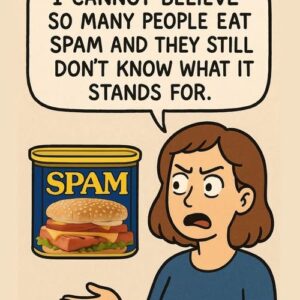That Christmas morning had started quietly, almost too quietly. The streets outside the café were dusted with snow, and the world felt still. Most people were home with family, opening presents and watching old holiday movies. I, on the other hand, was behind the counter making lattes for the few souls who wandered in. Working on Christmas wasn’t new to me—I’d done it before—but that year, something about it felt heavier. Maybe it was the ache of missing my parents across the country, or maybe it was simply the loneliness of watching others come and go while I stayed behind the counter, forcing a smile.
Around 9 a.m., a man walked in. He was older, with silver hair peeking out from under a wool cap and a scarf that looked like it had seen many winters. He smiled softly and ordered a black coffee. Nothing fancy. He chatted politely while I poured, his voice warm but weary. When I handed him his cup, he reached into his coat pocket and placed a single dollar on the counter as a tip.
It wasn’t much, but I smiled and thanked him anyway. Then, as I went to clear the counter, I noticed something tucked under the dollar bill—a small piece of paper, folded neatly. I didn’t think much of it at first, assuming it was a receipt or scrap. I slid it into the pocket of my apron and went on with the morning rush.
Hours passed. The café stayed slow, and I spent most of the afternoon cleaning tables and refilling the pastry case. By the time the clock struck three, the quiet had started to press down on me. I felt invisible—like the whole world was somewhere else, living, laughing, celebrating, while I was just… there.
When I reached into my apron to grab a pen, my fingers brushed against the folded paper I’d forgotten about. Curious, I pulled it out. On one side were bright, crayon-drawn snowmen—childlike, wobbly, full of joy. There were uneven orange triangles for noses, stick arms, and one snowman wearing what looked like a red baseball cap. It was sweet, the kind of drawing you’d stick on a fridge door.
I smiled for the first time that day. But when I turned the paper over, I froze.
In careful, looping handwriting, someone had written: “You’re doing great.”
That was it. Just three simple words. But they hit me like a wave. I don’t know why—maybe because I hadn’t heard anything kind or encouraging in weeks. Maybe because I’d been doubting myself more than I cared to admit. Maybe because those words, written by a stranger’s hand, felt like they were meant for me.
I sat down for a moment, holding the little drawing. The hum of the coffee machine faded into the background. I thought about that man—about how he’d probably been given the drawing by his grandkids and, instead of keeping it, chose to pass it on. Maybe he’d been in my position once. Maybe he just knew what it was like to feel unseen.
The rest of the day felt different. Customers came and went, and each one seemed less like a transaction and more like a chance to connect. I smiled genuinely, laughed easily, and when I closed up that night, I slipped the snowman drawing into my wallet.
It’s still there, years later—faded now, the crayon colors a little dull. But every time I come across it, I’m reminded that kindness doesn’t have to be grand. Sometimes, it’s a quiet message under a dollar bill, a simple note left for someone you’ll never meet again.
That man will never know what that small gesture did for me. But every Christmas since, I’ve left a note of my own—on a napkin, under a bill, sometimes scribbled on a coffee sleeve. Always the same words: “You’re doing great.” Because someone out there might need them as much as I once did.





